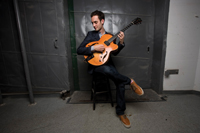Julian Lage '08: As Relevant as Possible

Julian Lage
When he was five years old, artist Julian Lage first picked up the guitar. Three years later, he was playing with Carlos Santana. By the time he was 13, he was performing "A Night in Tunisia" with Gary Burton '62 and Herbie Hancock.
The child prodigy from Santa Rosa, CA, who is a composer and arranger as well as a top-flight jazz player, has grown up. Lage, 21, released his first solo record, Sounding Point, in March to positive reviews on both sides of the Atlantic. "Julian Lage is a big talent blossoming," said the Guardian of London, praising his "agility, glowing tone and originality of phrasing."
The articulate and smooth-spoken Lage - with confidence and charisma to spare - is already an old pro (although described as a "youngster" by an admiring Washington Post critic) and philosophic about the nature, and nurture, of musical talent. "The gift," he says, "is the circumstance."
Take that boyhood gig with Santana. Lage was seven years old when he turned down Santana's request to perform with him onstage, believing he needed more time. "It can be a big setup for you to go from zero to a hundred too fast," Lage explains. So he waited until he was eight.
That same year, he was the subject of an Academy Award-nominated documentary short. That opportunity led him to the stage he shared with fellow wunderkinds at the Grammy Awards in 2000. Watching the live telecast was Grammy-winning vibraphonist Gary Burton, who took notice of Lage and tracked him down. Lage toured with Burton's quintet as a teenager and was featured on Burton's 2004 album, Generations.
Lage declined several offers to make his own record. But again, he want to make sure the timing was right. "You have to make decisions for the right reasons," he says. "When there were offers, my parents would talk about them with me. 'Would this one be helpful?' they would ask. They did it in a nurturing way." Lage is the youngest of five children. "I wasn't the only one they paid attention to; we were all equal."
Once a child prodigy himself, Burton became a trusted mentor and friend. Lage pays tribute to Burton as a bandleader. "He was the leader, but he knew how to feature a band," Lage says. It is clear that Lage attempts to do the same as he leads his own quartet.
From Burton he learned about organization and logistics, how to make a set list, prepare for a show, how to keep things fresh every night, and how to avoid exhaustion while traveling. "There is a science to it," Lage notes. "He kind of demystified it. That's kind of huge."
Burton also introduced Lage to Berklee. "I needed a place to be a research student. What Berkee offered me was a safe place to study and interact with people," says Lage, who now makes Boston his home base. "The openness is what I love about Berklee. They can recognize what students need at all levels."
While studying at Berklee, Lage decided to finally make his debut album. But he found it difficult to carry the traditional course load at the same time. The artist's diploma program at Berklee, limited to students with special musical talents and above-average proven ability allowed Lage to study classical composition and work on his CD.
Released on the Emarcy label, Sounding Point reflects Lage's multiple influences by mixing folk, blues, classical, and jazz. The album's special guests include Taylor Eigsti (piano), Béla Fleck (banjo), and Chris Thiele (mandolin). The album also features Tupac Mantilla (percussion), Aristedes Rivas (cello), Ben Roseth (saxophone), and Jorge Roeder (bass).
"The best music you make is relevant to the culture you are in, the timeframe you are in," Lage says. "I want to keep it as relevant as possible,"
Mary Hurley, a former newspaper reporter, is a grant writer in Berklee's Office of Institutional Advancement.
